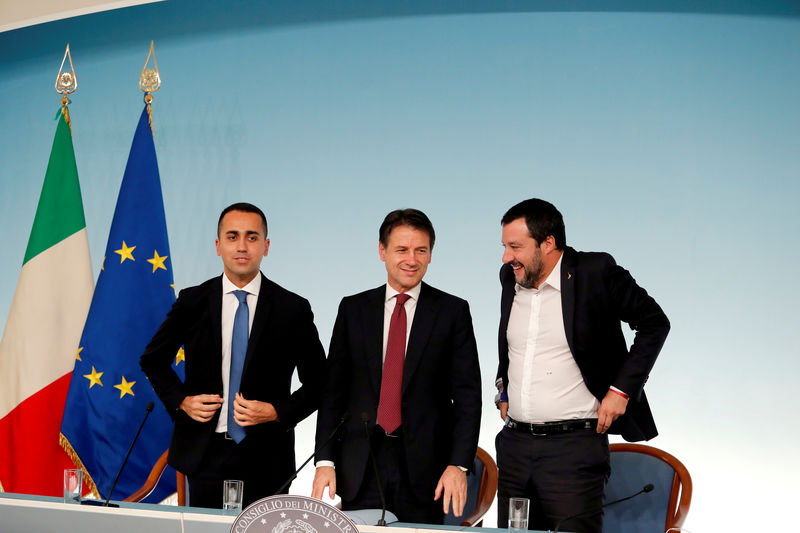By Giuseppe Fonte and Steve Scherer
ROME (Reuters) - Italy's governing coalition may reduce next year's budget deficit target to as low as 2 percent of gross domestic product to avoid disciplinary action from Brussels, two government sources said on Monday.
The move set off a rally in financial markets but it was unclear if the downward revision would be enough to satisfy the European Commission.
The goal in the draft budget is now 2.4 percent of GDP, much higher than the 0.8 percent set by the previous government, prompting European partners to first threaten a formal rebuke on Oct. 23.
The leaders of both parties in the governing coalition, which is composed of the right-wing League and the anti-establishment 5-Star Movement, signaled they are open to lowering the deficit goal ahead of a meeting to discuss the move scheduled for Monday evening.
The meeting, which another government source said would be at 7:30 p.m. (1830 GMT), could lead to a breakthrough in the standoff with Brussels that has roiled financial markets concerned about the sustainability of Italy's massive debt and a prolonged fight with its European Union partners.
Since presenting the draft budget two months ago, both coalition party leaders have repeatedly refused to budge on their spending plans.
The European Commission has called for a reduction of the structural deficit that adjusts for the economic cycle and one-off measures.
On Monday, League leader Matteo Salvini said Brussels had offered "positive feedback" on plans to lower the target.
Italian stocks rallied and bond yields fell by more than 30 basis points to reach over two-month lows on the prospect of a government climb down.
A meeting between Prime Minister Giuseppe Conte and European Commission President Jean-Claude Juncker on Saturday appeared to open the way to a softening of Italy's position.
The move also comes after the Bank of Italy warned on Friday that rising yields on Italian government bonds were hurting private wealth and undermining the country's financial sector, making it more expensive for companies to borrow.
On Monday, the European Central Bank's chief economist, Peter Praet, said increasing borrowing costs would offset any of the possible economic advantages to hiking spending in breach of EU rules next year.
Salvini, who is also deputy prime minister and interior minister, on Sunday said "no one is stuck" to the 2.4 percent target.
Deputy Prime Minister Luigi Di Maio, who heads the 5-Star, said as long as the measures in the budget remain unchanged, including the Movement's flagship citizen's income, then lowering the deficit goal is not a problem.

"What is important is that the budget contains the goals that we have established," Di Maio said on Monday. "Then if the negotiation means that the deficit (target) must come down a bit, for us it's not important."